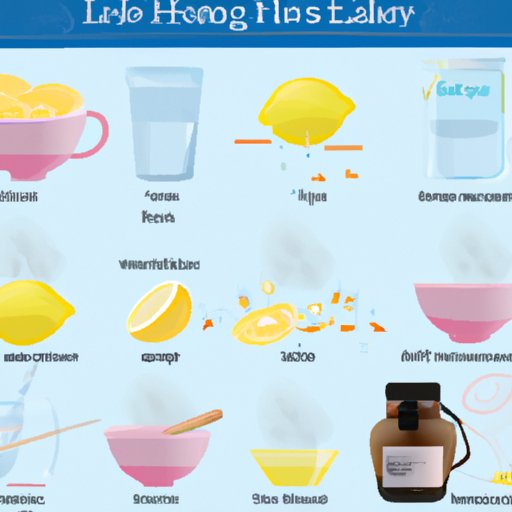Introduction
A cough is a reflex action used to clear your throat of mucus or other irritants. It’s typically the body’s response to an infection, allergy, or irritation. It can be either productive or unproductive. Productive coughs produce sputum, while unproductive coughs do not. Coughing can be annoying and disruptive, but fortunately, there are some natural remedies that may help.
Stay Hydrated
Staying hydrated is one of the most important steps to take when trying to stop coughing. Drinking fluids helps thin the mucus in your airways and makes it easier to expel. Adequate hydration also keeps your throat lubricated, which can reduce your need to cough.
Research shows that drinking plenty of fluids can ease coughing symptoms. In a study published in the journal Pediatrics, researchers found that children with upper respiratory infections who drank more fluids had less severe coughing symptoms than those who drank fewer fluids.
Water is the best choice for hydration, but other fluids such as herbal tea, broth, and juice can also provide relief. Avoid drinks with caffeine or alcohol, as these can be dehydrating.
Avoid Irritants
Certain environmental irritants can make coughing worse. Common triggers include dust mites, cigarette smoke, pet dander, mold, and pollen. If you’re exposed to any of these irritants, try to limit your exposure as much as possible.
To minimize your exposure, keep your windows closed during high-pollen times of the year. Change your air filters regularly and use an air purifier if necessary. Vacuum often to remove dust and pet dander. Make sure your home is free of moisture to prevent the growth of mold.
Take a Steamy Shower
Inhaling steam can help open your airways and reduce congestion. Taking a steamy shower can help loosen mucus and reduce coughing. You can also add essential oils to the steam to help soothe irritated airways.
One study found that inhaling eucalyptus oil vapor reduced coughing and improved overall respiratory function in people with acute bronchitis. The results suggest that inhaling steam with essential oils may be an effective remedy for coughing.
When taking a steamy shower, stay in the bathroom with the door closed for at least 15 minutes. Breathe in the steam deeply. You can also place a towel over your head to help trap the steam and allow it to reach deeper into your lungs.
Use a Humidifier
Humidifiers add moisture to the air, which can help reduce coughing by loosening mucus and soothing irritated airways. They can also reduce nasal congestion and make it easier to breathe.
When choosing a humidifier, look for one with a cool mist setting. Cool mist humidifiers are less likely to encourage the growth of mold and bacteria than warm mist models. You should also choose one that’s easy to clean and refill.
Drink Lemon Water
Lemon juice has acidic properties that can help break up mucus and reduce coughing. It also contains vitamin C, which can boost your immune system and help fight off infections.
To make lemon water, squeeze the juice of half a lemon into a glass of warm water. Add a teaspoon of honey and stir. Drink this mixture two or three times a day until your coughing subsides.
Try Honey
Honey has anti-inflammatory properties that can help reduce coughing and soothe a sore throat. It can also coat your throat and provide relief from irritation.
A small study found that taking a spoonful of honey before bed significantly reduced coughing in children with upper respiratory infections. However, do not give honey to children younger than 1 year old, as it can contain bacteria that can be dangerous for young babies.
Gargle Salt Water
Gargling salt water can help reduce inflammation and loosen mucus in your throat. This can help reduce the urge to cough.
To make salt water, mix a teaspoon of salt into a cup of warm water. Gargle the mixture for 30 seconds, then spit it out. Repeat two or three times a day until your coughing subsides.
Conclusion
Coughing can be annoying and disruptive, but there are some natural remedies that can help. Staying hydrated, avoiding irritants, taking a steamy shower, using a humidifier, drinking lemon water, trying honey, and gargling salt water can all help reduce coughing. However, if your symptoms persist, it’s important to seek medical treatment.
(Note: Is this article not meeting your expectations? Do you have knowledge or insights to share? Unlock new opportunities and expand your reach by joining our authors team. Click Registration to join us and share your expertise with our readers.)
